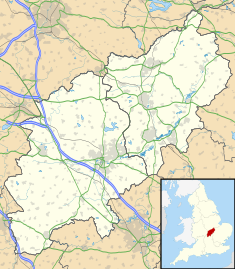The Moot Hall is a municipal building in Chapel Lane in Daventry, Northamptonshire, England. The building, which was the headquarters of Daventry Borough Council, is a Grade II* listed building.[1]
| The Moot Hall | |
|---|---|
 The Moot Hall | |
| Location | Chapel Lane, Daventry |
| Coordinates | 52°15′32″N 1°09′38″W / 52.2588°N 1.1605°W |
| Built | 1769 |
| Architectural style(s) | Neoclassical style |
Listed Building – Grade II* | |
| Official name | Moot Hall |
| Designated | 4 December 1953 |
| Reference no. | 1067667 |
History edit
The first moot hall in the town was a medieval structure erected on the east side of New Street in around 1150.[2] In the early 19th century civic leaders decided to demolish the old moot hall and, as a replacement, to make appropriate alterations to an existing house in Chapel Lane, which had been designed in the neoclassical style and built in ironstone in 1769.[2] The design of the house involved a symmetrical main frontage with three bays facing onto Abbey Street; the ground floor featured three round headed windows with archivolts and keystones flanked by niches created with short Doric order pilasters and entablatures.[1] At the corners of the ground floor there were larger Doric order pilasters supporting a wider entablature and a cornice.[1] The first and second floors featured sash windows with archivolts and keystones and at roof level there was a modillioned pediment.[1] A cupola and a weather vane were erected at roof level.[1]
In 1806, following its acquisition by the town authorities, the Chapel Lane building was remodelled to create a new moot hall with the Chapel Lane elevation and much of the internal structure being rebuilt in red brick.[3] A new porch was erected on that elevation and the pediment on the Abbey Street side was augmented by the installation of a 17th century clock, which had been recovered from the old moot hall, in the tympanum.[2] The original staircase from the building was transferred to the Manor House in Welton.[4] The moot hall became the meeting place of the local borough council as well as the venue for the weekly hearings of the local magistrates' courts.[5] The original mechanically operated clock was replaced with an electrically operated one during the mid-20th century.[2]
The moot hall continued to serve as the headquarters of the borough council for much of the 20th century[6] but ceased to be the local seat of government after the enlarged Daventry District Council was formed with its offices in Church Walk in 1974.[7][8] A local history museum was established in the moot hall in the early 1980s: items on display included the original mechanically operated clock as well as a set of imperial measures, typically held by local authorities to ensure tradesmen comply with the Weights and Measures Act 1824.[9] The building also accommodated the local tourist information office at that time.[10]
After the museum and tourist information office moved to New Street in 2004, the moot hall operated as an Indian restaurant from May 2006[11] and then saw a variety of commercial uses before being converted to become a children's nursery in January 2020.[12]
See also edit
References edit
- ^ a b c d e Historic England. "Moot Hall (1067667)". National Heritage List for England. Retrieved 15 May 2021.
- ^ a b c d "Daventry Self-Guided Walk" (PDF). Daventry Town Council. Retrieved 15 May 2021.
- ^ Lewis, Samuel (1831). A Topographical Dictionary of England. S. Lewis & Co. p. 11.
- ^ Pevsner, Nikolaus; Bailey, Bruce; Isham, Sir Gyles; Cherry, Brigid. The Buildings of England: Northamptonshire. Penguin Books. p. 173. ISBN 978-0-14-071022-9.
- ^ "Kellys Directory". 1906. Retrieved 15 May 2021.
- ^ "No. 46159". The London Gazette. 21 December 1973. p. 15252.
- ^ Local Government Act 1972. 1972 c.70. The Stationery Office Ltd. 1997. ISBN 0-10-547072-4.
- ^ "No. 47434". The London Gazette. 12 January 1978. p. 419.
- ^ "Made to measure". Daventry Express. 11 March 2017. Retrieved 15 May 2021.
- ^ Evans, Martin Marix; Burton, Peter; Westaway, Michael (2002). Battleground Britain: Naseby June 1645. Leo Cooper. p. 154. ISBN 978-0850528718.
- ^ Insley, Charles (2007). The Victoria History of The County of Northampton. University of London. p. 197. ISBN 978-1904356059.
- ^ "Cherry Blossom Day Nursery". Northampton County Council. Retrieved 15 May 2021.
